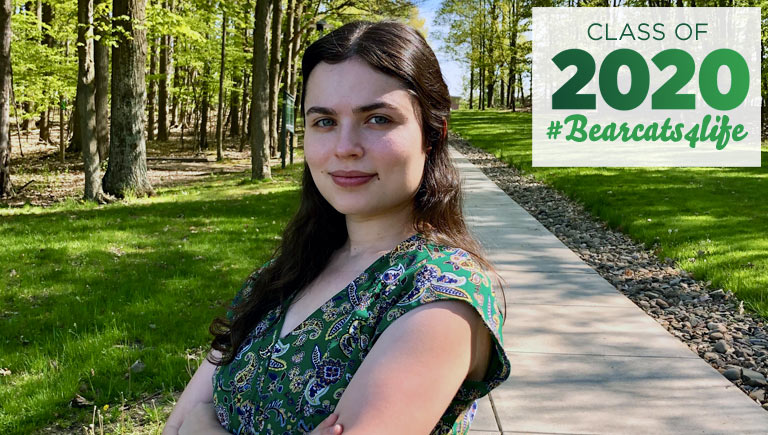Commencement 2020 profile: Rebecca Loibl
Earning bachelor's and master's degrees at Watson School puts student on path to career

For engineers, choosing which discipline to pursue is a bit like figuring out how your own brain works.
Rebecca Loibl’s brother — six years older than her — studied electrical and computer engineering, but she found herself drawn to mechanical engineering. It featured phenomena she could observe by sight and experience hands-on.
“I’m all about being able to see stuff happening,” said Loibl ‘18, MS ‘20. “The majority of the topics we cover in mechanical engineering are ones we can visualize in the world around us and aren’t so abstract.”
Her trajectory at Binghamton University’s Thomas J. Watson School of Engineering and Applied Science has taken her to ever-higher achievements as a graduate student, researcher and teaching assistant. She earned her master’s degree in May, and starting this fall she will start her career with a company near Cortland.
“I had to create my own path,” she said, reflecting back on her time at the Watson School. “It’s really important to know that you don’t have to be the best student to do research. You don’t have to be perfect on your résumé to get a job. You don’t have to be this straight-A student to try for opportunities.”
Loibl first became interested in engineering during high school in Sidney, N.Y., thanks in part to Project Lead the Way, a nonprofit organization that develops STEM curricula for U.S. schools. Her teacher, Mrs. Race, encouraged all students to get involved in the program, even if they didn’t plan to pursue an engineering or technology career.
After high school, Loibl attended SUNY Broome for two years under the “stepping stone” Binghamton Advantage Program, transferring to the Watson School for her bachelor’s degree.
She worked as an undergraduate researcher with Assistant Professor Scott Schiffres’ Nano-Micro Thermal Group, at first helping graduate students with other projects and later building her own lab setup to study adsorption cooling systems.
“With all the activities and assignments undergrads have during the semester, it’s challenging for them to dig into research and commit the necessary time to really have an impact,” Schiffres said. “Rebecca was very dedicated and spent time every week helping to run experiments, and later improving the setup and modifying the data collection code.”
When it came time to select a graduate school, Binghamton was the obvious choice. Loibl knew the faculty and the campus, and she felt better placed for opportunities to fund her education.
“Staying at Binghamton meant I had the opportunity to tie my interest in sustainability to a research project.” she said. “Professor Schiffres already knew my background, and he tried to place me on a project that fit my interests.”
Her graduate research developed improvements for an environmentally friendly cooling system that utilizes wasted heat, with silica gel as an adsorbent and water as a refrigerant. Part of her findings were funded through a partnership with EthosGen, a startup that specializes in helping companies capture and recycle energy from their own equipment.
“I was focused on finding solutions that were innovative and cost-friendly, with an entrepreneurial mindset,” she said. “There are always high-tech solutions, but then the overall price of that system can increase a lot.”
Although Loibl applied her work mainly to heating and cooling systems for buildings, she also knows it could be put to other purposes, too.
“There are problems in developing countries with storing food,” she said. “They produce enough food, but transporting it from point A where it’s produced to point B where someone is consuming it, there’s no reliable refrigeration chain. This is a potential technology to create refrigeration without having reliable access to the electrical grid.”
With research labs closed because of the COVID-19 pandemic, Loibl joined Schiffres and other students to help with mask-testing experiments in Schiffres’ garage. She is a co-author on their recently submitted article titled “Filtration Efficiency, Breathability and Reusability of Improvised Materials for Face Masks.”
“I have no doubt that Rebecca’s characteristics will allow her to succeed in her career. She is dedicated and smart, and she works well with others,” Schiffres said. “I have encouraged her to consider continuing with her PhD, after she gains some industry experience.”
Loibl will start a new job in September at Pall Corp., a global supplier of filtration, separation and purification products headquartered in Port Washington, N.Y. (just outside of Cortland). As part of its research and development leadership program, she will be assigned to a new project every six months for the first two years, then will transition to a permanent role.
This summer, though, she is working as a tutor with Binghamton High School through the Upward Bound Math-Science Program. Through virtual workshops, one-on-one sessions and STEM-related activities, she hopes to inspire the same love for science and engineering that set her on her own career path.
“I wanted to do something a little bit different with the gap I have this summer, instead of doing research again,” she said. “I’ve been working a lot in the lab, and I want this experience of working with people and giving back a little, now that I’m done with my degree.”

